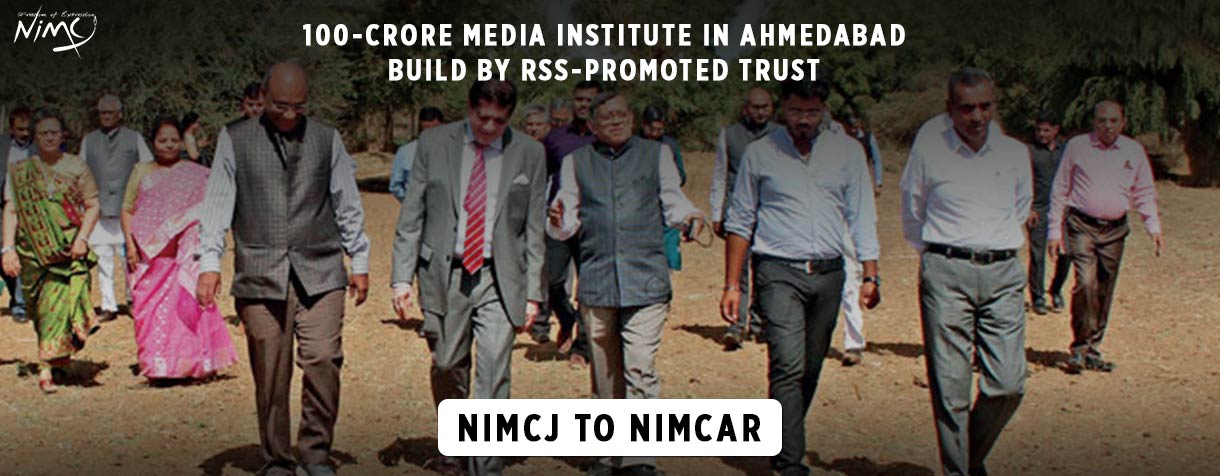
The
Gujarat model of the ascension of the RSS and its political wing BJP is all set to
be replicated in the media and journalism field. And once again, Gujarat will
feature prominently in it. An RSS-promoted trust will spend Rs 100 crore to set
up a national media institute in Gujarat across a 10-acre campus equipped with the technologically advanced studio, Media Research Centre, Media Museum and other
facilities with the aim to transform media and communication education in India.
The
RSS-promoted trust, VSEF, already runs a media institute in Ahmedabad since
2007 via National Institute of Mass Communication and Journalism (NIMCJ). It
will be amalgamated into National Institute of Mass Communication and Research
(NIMCaR) that will come up in Hajipur village, about 32 km from Ahmedabad.
The
ground-breaking ceremony for the institute was held on February 2019 and NIMCaR
will become operational by 2021. Sources said the purpose of the institute is
to prepare journalists that can take on left-leaning intellectuals in the print
and electronic media.
Achyut
Yagnik, a Gujarat-based political scientist, told Mirror: “Media is a powerful
tool that helps build public opinion. What better way to do it than prepare an
army of journalists who can go out and do it. The journalism institute will
help the Sangh Parivar create its cadre in the field of media. RSS is into
spreading Hindutva and its aim is the creation of Hindu Rashtra (nation). The
media institute is just another step in that direction.”
Urvish
Kothari, a senior journalist, said: “It is the democratic right of an
individual or a group of individuals to open any institute. It is equally
important that such institutes ensure that the core values of journalism are
not inversed. In any institute, a journalist should be taught not to forget his
role to expose the government, irrespective of party or ideology. For positive
news, there is always an information department in any government.” Bharat
Pandya, Gujarat BJP spokesperson, said: “This institute is in the media field
for the last few years. Its expansion using advance technology will promote
positive journalism.
There
are many constructive and positive events in the society which can be
highlighted. The institute will help make journalism extensive. Media should be
all-pervasive and touch everyone’s life. Hope this institute will give a new
direction to youth and people from every field to take advantage of the
opportunities it will provide.”
When
asked about NIMCaR’s vision and the need for it, Managing Trustee of Vishwa
Samvad Education Foundation (VSEF) that is building NIMCaR, and senior RSS
leader, Pradip Jain said: “In our country, journalism has its roots in ancient
times. Bhagwan Narad can be considered the first journalist. But our
journalistic legacy has never been highlighted in a collective form.
Deterioration of values and nationalism in the society for the last few years and
negativity has perpetuated an environment of disappointment.
“There
are events and news that are constructive in nature and can infuse positivity
in society. Highlighting such news can boost the morale of society. These
are things that do not reach people. We want to promote positivity and
nationalistic spirit.”
Jain
stressed: “As India moves towards becoming the world leader, mass communication
will prove to be the fourth pillar. And we want people to be prepared in that
direction.”
Highlighting
the fact that there’s hardly any research done in the field of media at
present, Jain said there will be a separate block at NIMCaR’s lush green and
eco-friendly campus dedicated to research work. The institute will invite
global faculty to teach best practices and trends to about 400 undergraduate
and postgraduate students. Likewise, the students will go abroad for global
exposure.
NIMCaR
will boast of a Newseum that will feature eminent media person from India and
abroad, their work and biographies. It will have a section on the history of journalism and its evolution over time. Most importantly, it will feature
journalists who lost their lives while on duty and did great service to India.
The VSEF has also invited donation for buildings of journalism, communication, Newseum, Media Research Centre, auditorium, cafeteria, open-air theatre among others. Donations have been solicited from India and abroad considering the scale of the project.
Source: Ahmedabad Mirror
01 Aug 2019
Post by : NIMCJ